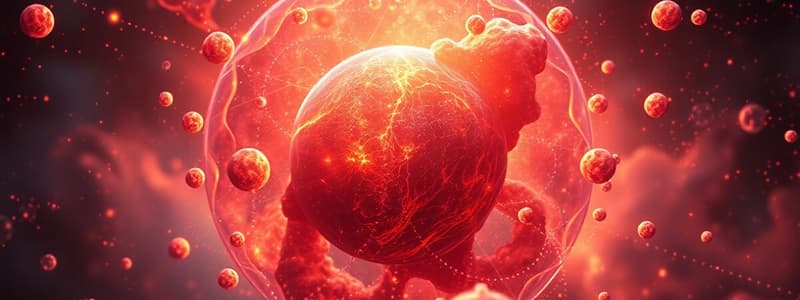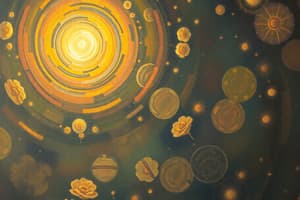Podcast
Questions and Answers
What is the correct definition of matter?
What is the correct definition of matter?
- A substance that can be felt or touched.
- Only solid and liquid substances.
- Anything that has mass and volume. (correct)
- Anything that has weight and density.
Which statement accurately describes the composition of atoms?
Which statement accurately describes the composition of atoms?
- Atoms can only be composed of protons and electrons.
- Atoms are particles that cannot combine to form molecules.
- Atoms include neutrons, protons, and electrons. (correct)
- Atoms consist of a nucleus made of electrons.
What defines a substance as an element?
What defines a substance as an element?
- It is composed of multiple types of atoms.
- It must have massless properties.
- It can exist in both solid and liquid states.
- It is made up of only one type of atom. (correct)
Which of the following best describes the properties of gases?
Which of the following best describes the properties of gases?
How does mass differ from matter?
How does mass differ from matter?
Which example illustrates the concept that gases have mass?
Which example illustrates the concept that gases have mass?
What can be said about the scientific classification of atoms?
What can be said about the scientific classification of atoms?
What is the primary definition of matter?
What is the primary definition of matter?
Which of the following best describes the composition of atoms?
Which of the following best describes the composition of atoms?
Why was the concept of air being matter difficult for ancient people to accept?
Why was the concept of air being matter difficult for ancient people to accept?
Which statement accurately describes the formation of molecules?
Which statement accurately describes the formation of molecules?
What differentiates gases from other states of matter?
What differentiates gases from other states of matter?
What is a key difference between matter and mass?
What is a key difference between matter and mass?
At what scale can ordinary atomic matter be observed without a microscope?
At what scale can ordinary atomic matter be observed without a microscope?
What characterizes microscopic scale properties?
What characterizes microscopic scale properties?
How does the conservation of mass relate to matter?
How does the conservation of mass relate to matter?
What does the law of conservation of mass state?
What does the law of conservation of mass state?
In the burning of wood, what primarily happens to the matter involved?
In the burning of wood, what primarily happens to the matter involved?
Which of the following best describes a reactant in a chemical reaction?
Which of the following best describes a reactant in a chemical reaction?
What happens to the mass of a burning tree as it turns into ash?
What happens to the mass of a burning tree as it turns into ash?
Which of the following statements accurately differentiates between matter and mass?
Which of the following statements accurately differentiates between matter and mass?
Which of the following compounds can be produced during the combustion of wood?
Which of the following compounds can be produced during the combustion of wood?
What is the primary role of oxygen in the burning process of wood?
What is the primary role of oxygen in the burning process of wood?
Which of the following is a characteristic of gases produced during a chemical reaction?
Which of the following is a characteristic of gases produced during a chemical reaction?
Flashcards
Matter Definition
Matter Definition
Anything that has mass and volume (takes up space).
Mass
Mass
A quantitative property of matter and other substances or systems.
Atoms
Atoms
The building blocks of matter.
Elements
Elements
Signup and view all the flashcards
118 atoms
118 atoms
Signup and view all the flashcards
Gases are matter
Gases are matter
Signup and view all the flashcards
Matter in the Universe
Matter in the Universe
Signup and view all the flashcards
Measuring matter
Measuring matter
Signup and view all the flashcards
Macroscopic Scale
Macroscopic Scale
Signup and view all the flashcards
Microscopic Scale
Microscopic Scale
Signup and view all the flashcards
Matter vs. Mass
Matter vs. Mass
Signup and view all the flashcards
Matter Components
Matter Components
Signup and view all the flashcards
Macroscopic Properties
Macroscopic Properties
Signup and view all the flashcards
Microscopic Properties
Microscopic Properties
Signup and view all the flashcards
Matter vs. Energy
Matter vs. Energy
Signup and view all the flashcards
Law of Conservation of Mass
Law of Conservation of Mass
Signup and view all the flashcards
Reactant
Reactant
Signup and view all the flashcards
Product
Product
Signup and view all the flashcards
Chemical Change
Chemical Change
Signup and view all the flashcards
Combustion
Combustion
Signup and view all the flashcards
Conservation of Mass in Burning
Conservation of Mass in Burning
Signup and view all the flashcards
Antoine Lavoisier
Antoine Lavoisier
Signup and view all the flashcards
Study Notes
MATTER AND ENERGY
- Matter is anything that has mass and occupies space
- Matter is composed of atoms, not energy phenomena or waves
- Matter is viewed macroscopically (large scale, observed with naked eye) or microscopically (small scale, requires lenses/microscopes)
- Matter is not the same as mass – mass is a quantitative property of matter
WHAT IS MATTER?
- Matter is composed of atoms
- Atoms combine to form elements
- Elements combine to form compounds
- There are 118 types of atoms known
- Elements are substances composed of a single type of atom and cannot be broken down
- Compounds are substances composed of two or more different elements in fixed proportions
- Matter exists as solid, liquid, or gas (and plasma)
- The state of matter (solid, liquid, gas) is a physical property
CLASSIFYING MATTER ACCORDING TO ITS STATE—SOLID, LIQUID, AND GAS
- Solids have a definite shape and volume
- Liquids have a definite volume but take the shape of their container
- Gases have neither a definite shape nor volume
- Plasma is a fourth state of matter
CLASSIFYING MATTER ACCORDING TO ITS COMPOSITION
- Matter is classified into pure substances and mixtures
- Pure substances have a constant composition and properties throughout
- Elements cannot be broken down into simpler substances
- Compounds are composed of two or more different elements in fixed proportions
- Mixtures are combinations of two or more substances that retain their individual identities and can be separated by physical means
- Homogeneous mixtures have a uniform composition and properties like saltwater (solution)
- Heterogeneous mixtures have a non-uniform composition and properties like vegetable soup
DIFFERENCES IN MATTER - PHYSICAL AND CHEMICAL PROPERTIES
- Physical properties can be observed or measured without changing the identity of the substance, like color, density, hardness, melting point, boiling point
- Chemical properties describe a substance's ability to undergo a chemical change or reaction
- Chemical changes create new substances different from the original ones
CHANGES IN MATTER - PHYSICAL AND CHEMICAL CHANGES
- Physical changes do not change the identity of a substance—like phase changes
- Chemical changes create new substances with different properties—like burning
CONSERVATION OF MASS - THERE IS NO NEW MATTER
- The law of conservation of mass states that matter cannot be created or destroyed in a chemical reaction.
- Mass before and after a chemical reaction remains constant.
ENERGY
- Energy is the ability to do work or produce heat
- Two types of energy are kinetic and potential
- Kinetic energy is associated with motion
- The faster and heavier an object is, the greater its kinetic energy
- Potential energy depends on an object's position
- This includes chemical potential energy from the chemical bonds of matter.
ENERGY AND CHEMICAL AND PHYSICAL CHANGE
- Energy is transferred from one object to another as work or heat
- Endothermic processes absorb heat from the surroundings
- Exothermic processes release heat to the surroundings
TEMPERATURE - RANDOM MOTION OF MOLECULES AND ATOMS
- Temperature measures average kinetic energy
- Different scales to measure temperature exist (Fahrenheit, Celsius, Kelvin)
- The Kelvin scale is based on molecular motion
Studying That Suits You
Use AI to generate personalized quizzes and flashcards to suit your learning preferences.




